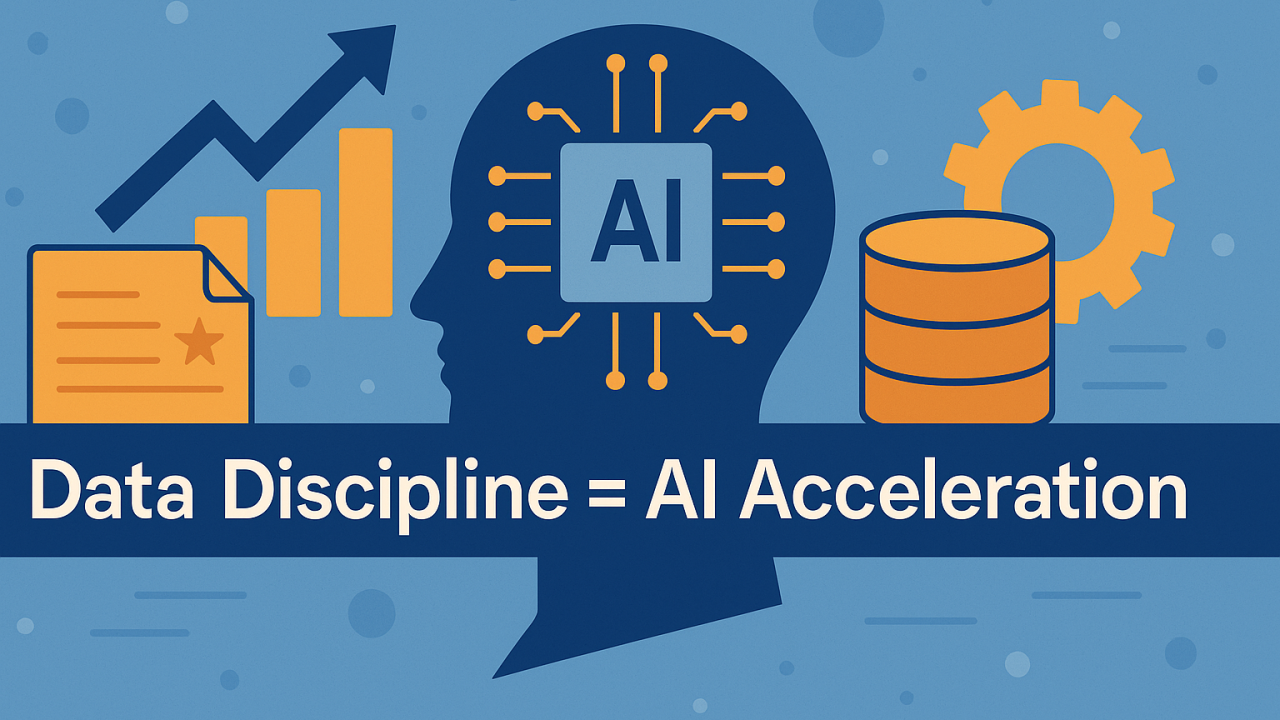Data Discipline = AI Acceleration

A Framework-First Approach to Scaling AI with Confidence
Artificial intelligence may be the buzzword of our time, but beneath all the hype, one truth remains: data is the real currency. Models evolve, tools change, but without disciplined data governance, AI quickly shifts from opportunity to overhead - becoming a costly experiment rather than a business accelerator.
Policies Aren’t Frameworks
A lot of organizations believe they’re doing data governance. They have policies. They check compliance boxes. Maybe they’ve stood up a catalog or two. But here’s the question that really matters: Are you governing in a way that actually promotes AI acceleration?
Policies set the rules - but frameworks turn those rules into action. A framework connects people, process, standards, and technology so that governance becomes a living system, not just paperwork. Without one, your AI efforts remain theoretical. With one, they scale.
The Framework Behind Acceleration
Think of a data governance framework as the invisible scaffolding that makes AI stand tall. It’s built around five pillars - the why, what, who, when, and how of governance:
- Why (Charter): Defines purpose and vision. It’s the constitution of your data practice - the document that keeps focus steady when leadership changes.
- What: The core build: catalogs, lineage, glossaries - the elements that make data visible and connected.
- Who: Clear ownership through defined roles and responsibilities so governance doesn’t become “everyone and no one.”
- When: A roadmap that prevents “boiling the ocean” and focuses on achievable wins.
- How: Repeatable processes that turn discipline into muscle memory.
The Charter: Your Constitution of Data
Every strong framework begins with a charter - the document that brings order from chaos. Carl Jung once said, “In all chaos there is a cosmos.” That’s as true in data as it is in psychology.
A well-written charter defines purpose, vision, and boundaries. It establishes oversight through a governance council and makes sure priorities are agreed upon - not invented on the fly. And just like the U.S. Constitution, it’s not static. It evolves as technology, regulations, and priorities shift.
The most effective charters share six traits:
- Focus – Clear purpose and direction
- Buy-in – Backed by leadership
- Boundaries – Defines what governance is vs. isn’t
- Priorities – Prevents scope creep
- Evolution – Reviewed and amended regularly
- Audit Signals – Demonstrates credibility and discipline
When the Shoes Don’t Fit
Your governance framework has to fit your organization. Too small, and it won’t support growth. Too big, and it will slow you down.
Look at Citigroup. In 2020, regulators fined them $400 million for weak controls and governance gaps. Their “shoes” didn’t fit the size of their operations. On the other end of the spectrum, smaller organizations often try to wear “enterprise-sized shoes” built for giants like Google or LinkedIn - and stumble as a result.
The right fit is what matters. Start with what aligns to your scale and maturity, evolve as you grow, and scale your governance when your “feet” do.
Discipline Is the Enabler, Not the Enemy
When people hear “governance,” they think red tape. But discipline isn’t the enemy of speed - it’s the enabler. Frameworks actually remove bottlenecks by standardizing approvals and clarifying roles. Innovation without discipline? That’s where most failures happen.
And those failures are real: Gartner projects that over 40% of AI projects will be scrapped by 2027 due to unclear business value and weak controls. RAND and Informatica estimate that 80% of AI projects fail overall, twice the rate of traditional IT projects.
The takeaway? AI doesn’t fail because of bad models - it fails because of poor governance.
Data Discipline = AI Acceleration
With a solid framework and a living charter, governance stops being overhead and becomes a strategic advantage. It aligns executives, teams, and priorities - transforming AI from a risky experiment into a trusted accelerator.
At nvisia, we’ve seen this play out again and again. When governance is treated as a discipline, not a hobby, organizations scale faster, smarter, and with far fewer surprises.
Build the framework. Write the charter. Accelerate AI.
Meet the Expert: Tim Liebl
Data Strategist | AI Governance Architect | Framework Builder for Scalable Innovation
 Tim Liebl specializes in helping organizations turn data discipline into business acceleration. His work centers on modernizing architectures, designing governance frameworks, and translating emerging technologies like AI into actionable enterprise strategies.
Tim Liebl specializes in helping organizations turn data discipline into business acceleration. His work centers on modernizing architectures, designing governance frameworks, and translating emerging technologies like AI into actionable enterprise strategies.
With more than 15 years of experience spanning software engineering, DevOps, and cloud data platforms, Tim approaches every challenge with a blend of technical precision and business pragmatism. He’s passionate about helping teams build the scaffolding that allows innovation to scale - frameworks and charters that don’t slow AI down, but make it sustainable. He also serves as an IT Advisor at Waukesha County Technical College, mentoring the next generation of technology leaders.
“Policies set the rules — but frameworks turn those rules into action.”
Whether he’s leading enterprise architecture discussions, mentoring technologists, or advising executives on governance maturity, Tim consistently focuses on building clarity, trust, and scalability into the systems that power AI-driven transformation.
Originally published on nvisionaries - follow us there for even more insights!




